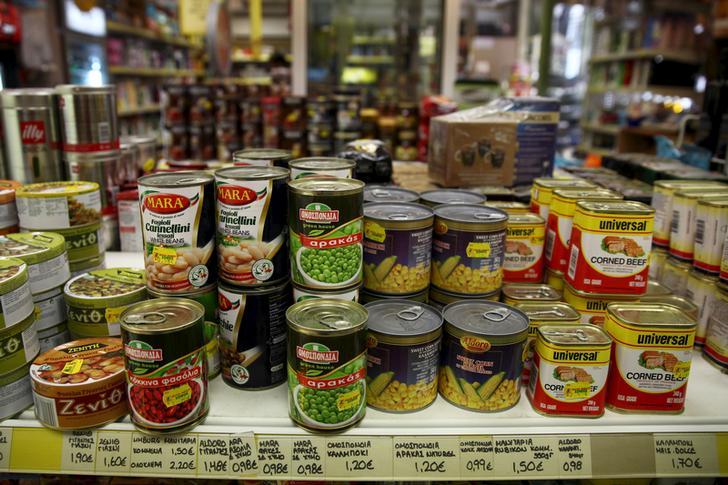Almost everything in sight in Greece to be taxed, including its 14th century moonshine
Goods for sale are displayed inside a grocery shop in central Athens, Greece, July 20, 2015. Greece reopened its banks and started the process of paying off billions of euros owed to international creditors on Monday. Increases in value added tax agreed under the bailout terms also took effect, with VAT on food and public transport jumping to 23 percent from 13 percent.
It’s a new day in Greece, as if someone has pressed the re-start button.
That’s how Athens-based reporter Christos Michaelides describes the fact that banks re-opened in Greece on Monday after being forced to close for three weeks to prevent a run on their cash machine, and that new taxes have gone into effect adding roughly 10 percent to the cost of just about everything, including transportation, sugar, cocoa, taxis and funerals.
The ability once again to withdraw cash is seen by some as a sign of confidence in a three-year, 93 billion dollar bailout plan that will hopefully keep Greece from crashing out of the Euro zone. The new taxes are seen as austerity measures that will help pay for the Euro-loans.
Hardly anything, with the exception of fresh meat, vegetables and fruit, has been spared by the new tax laws.
Even one of Greece’s national drinks has come in for a new tax. But it’s controversial. Tsipouro is a traditional, often homemade spirit. Technically it’s a strong brandy that’s made from pomace (the residue of pressed grapes). It’s quintessentially Greek because it was first made by Greek Orthodox monks in the 14th century living on Mount Athos and it remains popular to this day.
“Tsipouro is Greek moonshine. It originates in Crete, it’s very, very strong, stronger than ouzo, it’s about 45 percent alcohol, and people like it very much, “says Michaelides. He explains that the stuff is usually sold in bulk at stores so customers typically refill their own bottles from a big barrel.
“You can walk into one of these traditional liquor shops with your own bottle and you can just tell them to fill it up. So you just open the tap and this drink goes into your bottle, and then you usually drink it very, very cold.”
Michaelides says the potent Greek moonshine “goes directly where it should go, straight to the head.”
But now the Greek government has found a way to tax consumption of Tsipouro. Up until now taxes were only imposed on packaged goods like Cokes, bottled beers, or canned tomatoes.
“Everything which is packaged is being taxed at a rate of 23 percent,” says Michaelides. As a result, many were hoping that Tsipouro would slip past the tax authorities or had been spared because it’s sold in bulk.
Some consumers had planned to stop buying bottled liquors, says Michaelides, and were instead going to turn to buying this moonshine straight from the barrel “in order to economize, to keep their money in their pockets, but the government soon caught on and came out with a special measure to say in effect, 'Oh no, you're not going to get away with this, we’re going to tax that as well.’ So that special tax on tsipouro has made people very angry on top of everything else,” says Michaelides.
Cheers.
Every day, reporters and producers at The World are hard at work bringing you human-centered news from across the globe. But we can’t do it without you. We need your support to ensure we can continue this work for another year.
Make a gift today, and you’ll help us unlock a matching gift of $67,000!
